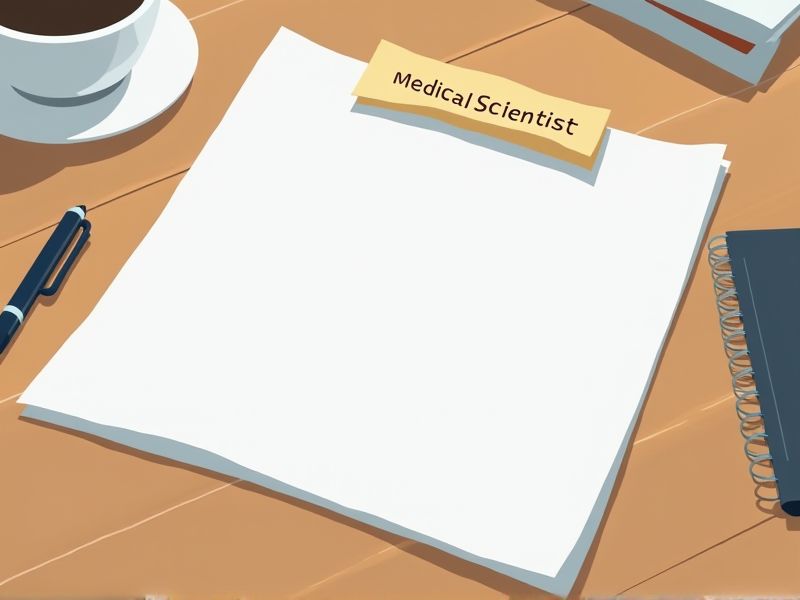
Medical Scientists engage in research that requires a deep understanding of complex biological systems and the ability to handle sensitive and sophisticated laboratory equipment. Certain certifications validate their expertise and commitment to maintaining high standards in research methodologies and ethical practices. Certification requirements often stem from the need to meet regulatory standards and to ensure the reliability and accuracy of research findings. Essential certifications for Medical Scientists provide a foundation for credibility and advancement in their field.
Certified Clinical Research Professional (CCRP)
The CCRP certification signals a medical scientist's proficiency in managing clinical trials, ensuring research adheres to regulatory standards. This expertise minimizes errors in trial execution, improving data integrity and patient safety. Holding a CCRP credential enhances employability and career advancement by demonstrating a commitment to professional development. Certification fosters trust among peers and stakeholders by evidencing the scientist's dedication to ethical and effective research practices.
Good Clinical Practice (GCP) Certification
Obtaining a GCP Certification ensures that medical scientists adhere to standardized ethical and scientific quality standards critical for conducting clinical trials involving human subjects. This certification is vital to ensure the protection of human rights and the integrity and accuracy of trial results, aligning with international regulations. Medical scientists with GCP Certification can enhance the credibility of their research, facilitating acceptance in global regulatory submissions. By adhering to GCP guidelines, medical scientists contribute to higher transparency and public trust in clinical research outcomes.
Certified Clinical Research Coordinator (CCRC)
The need for a Certified Clinical Research Coordinator arises because they ensure that clinical trials adhere to protocol specifications, safeguarding data integrity and patient safety. Their expertise in regulatory compliance helps medical scientists navigate complex regulatory landscapes, minimizing risks of legal setbacks. By managing day-to-day trial operations, CCRCs allow medical scientists to concentrate on high-level research objectives and data analysis. The role of a CCRC also enhances trial efficiency, leading to quicker, more reliable research outcomes.
Certified Medical Laboratory Scientist (ASCP MLS)
Certified Medical Laboratory Scientists (ASCP MLS) bring precise laboratory testing skills, essential for accurate diagnosis and treatment. Their expertise ensures reliable test results, which aid medical scientists in developing and validating clinical research. With their knowledge in quality control and instrumentation, they maintain laboratory standards and contribute to research integrity. Collaborating with medical scientists, they help translate findings into practical medical applications.
Board Certification in Clinical Chemistry (ABCC)
Board Certification in Clinical Chemistry (ABCC) ensures that medical scientists possess a standardized level of expertise, which directly impacts the accuracy and reliability of diagnostic tests. Achieving certification signifies a commitment to ongoing professional development, keeping scientists updated with evolving laboratory technologies and methodologies. This certification acts as a benchmark for employers, facilitating the recruitment of qualified individuals who can maintain high-quality laboratory services. As clinical environments become increasingly complex, certified professionals contribute to improved patient outcomes through enhanced interpretation of laboratory results.
American Board of Medical Genetics and Genomics (ABMGG) Certification
ABMGG certification is required for medical scientists as it ensures they meet specific standards of expertise in genetics and genomics. This certification enhances the credibility and trust of professionals in clinical and research settings, impacting patient care and scientific advancements. The credential opens up specialized career opportunities and recognition among peers, contributing to professional growth. In the evolving landscape of medical science, ABMGG certification underscores a commitment to maintaining high competency and staying current with advancements in genetic and genomic knowledge.
Certified Bioinformatics Professional (CBP)
The increasing complexity of genetic and biological data necessitates the skills of a Certified Bioinformatics Professional (CBP) in data analysis for medical scientists. Consequently, CBPs help extract meaningful insights from large datasets, which is crucial for identifying disease patterns and potential treatments. This expertise in bioinformatics leads to more efficient research processes and enhances the accuracy of experimental outcomes. Medical scientists collaborating with CBPs can potentially accelerate the development of personalized medicine, improving patient care.
SAS Certified Specialist: Base Programming Using SAS 9.4
Medical scientists often work with large datasets, and the SAS Certified Specialist: Base Programming Using SAS 9.4 credential demonstrates proficiency in managing and analyzing this data. This certification ensures that medical scientists can effectively use SAS software to streamline data analysis processes, leading to more accurate research results. Mastery of SAS 9.4 aids in generating statistical insights, crucial for evidence-based medical research. As healthcare data continues to grow, SAS skills enhance a scientist's ability to model and interpret complex datasets.
Project Management Professional (PMP)
Medical Scientists often engage in complex research projects that require effective coordination and resource management; PMP certification equips them with skills to manage these complexities. Effective project management ensures adherence to timelines and budgets, minimizing research delays and cost overruns. PMP training enhances communication and leadership skills, crucial for collaborative work in interdisciplinary scientific environments. With structured project management frameworks, Medical Scientists can better handle regulatory compliance and ethical considerations, improving the overall success of scientific studies.
Certified Quality Improvement Associate (CQIA)
Medical scientists often deal with complex processes that impact health outcomes, necessitating a CQIA for effective quality control. The CQIA certification equips them with the skills to implement standardized procedures, reducing errors in research and experimentation. Enhanced quality management through a CQIA also ensures compliance with regulatory standards, crucial for medical research credibility. In an environment reliant on accuracy, the CQIA empowers medical scientists to institute continuous improvement initiatives.
Summary
By gaining certifications, you enhance your credibility and are likely to gain increased trust from peers and patients. Certification often leads to access to advanced professional opportunities and higher salaries. Acquiring certifications usually requires keeping up with the latest research, which in turn boosts your expertise and competency. As a certified professional, you can potentially contribute more effectively to groundbreaking research and innovation in the medical field.
